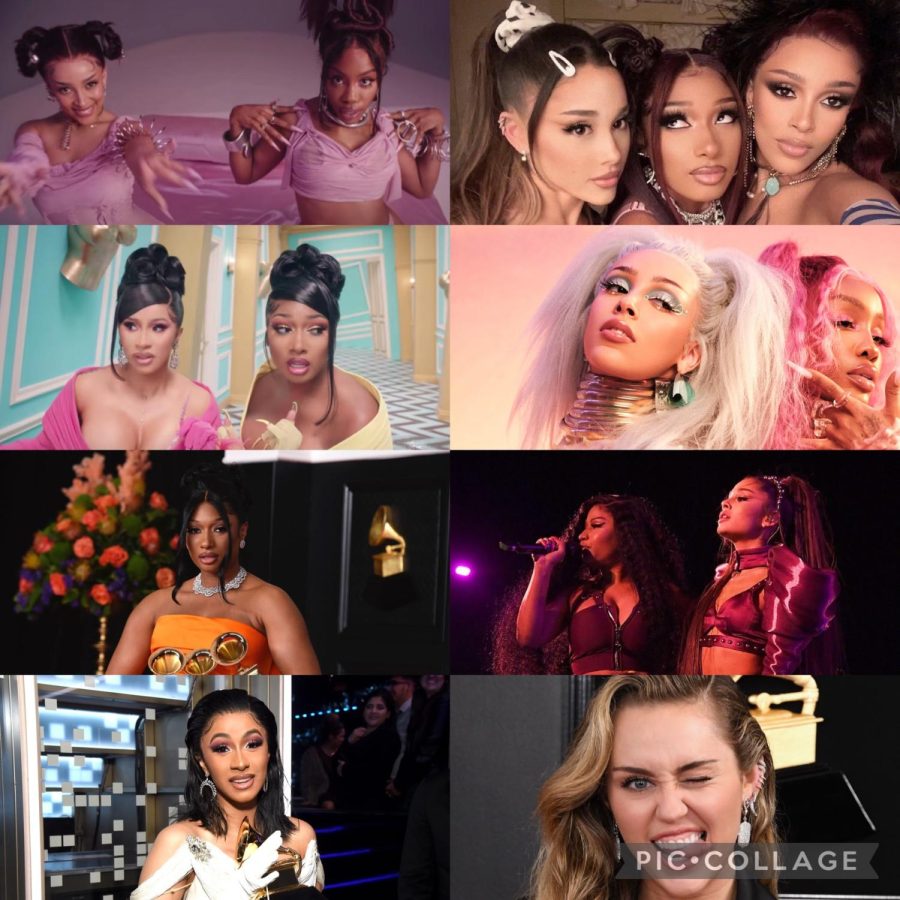Inspiration vs Bad Influence
Women in the music industry have been working hard to separate themselves from their male counterparts.
The feminist movement has taken over the music industry in recent years. It’s no secret that women have been held to different standards compared to men when it comes to artistry and image. However, it may come to a surprise that women rebel against societal expectations and fabricate number one hits that rock the boat and imperatively influence female youth. The controversy regarding the evolution of female sound in the music industry, explores if the current female figures are inspiring young girls to move forward positively or refraining them from understanding the true definition of feminism: the advocacy of women’s rights on the basis of the equality of the sexes.
Some of the more popular names in music have taken on a more explicit song base and persona within the media. Female artists such as Megan Thee Stallion, Cardi B, SZA, Nikki Minaj, Arianna Grade, and Miley Cyrus, have produced songs that continually dominate the releases of other artists. Something about their music and persona captures the attention of listeners and leaves them wanting more. Junior, Kirsten Parker elaborates on why some of these artists are her favorite and how they have influenced her personally.
“I love Summer Walker because her lyrics are very creative. Cardi B. and Megan produce really cool hype songs. These artists have influenced me by teaching me to love myself. They are giving myself as well as other girls my age, something to feel empowered by. They send the message that we don’t need anyone but ourselves and we are capable of doing anything,” said Parker.
Artists are having an impact on women of all ages. Even adults identify with aspects of their music and persona. Listeners find elements of their creativity that provide comfort and security within who they are and what they are experiencing. Theater Arts teacher Cara Cook, connects with the following artist whose music helped her through a tough period in her life.
“Billie’s album got me through a nasty breakup. Lizzo keeps me motivated to move and stay human. Megan’s music is like an ear to the ground. It keeps me in the loop of language as we change, as well as what the empowered woman is chasing now. Gwen Stefani is catchy and happy, balanced with perspective. I really respect these artists and their process,” said Cook.
While these artists are applauded by teen girls and adults, their more mature audience recognizes that their music may be detrimental to the development of younger girls. Sophomore Nyla Sims is a big fan of most current female artists, but knows if she were younger she could interpret their content the wrong way.
“The way they portray themselves as artists is a reflection of their character. These women are brave for the way they represent themselves. They are who they are and they aren’t ashamed of it. Which is great because it teaches girls to un-apologetically be themselves. It’s just that sometimes their message can be deemed inappropriate, so their audience should be older to truly understand their content,” said Sims.
Junior Isabella Cortez, respects some of the more popular and provocative female artists, but doesn’t feel empowered by their music or thinks younger girls should engage in their message.
“When I was younger I remember seeing the way Miley Cyrus started to portray herself and thinking it was inappropriate. Now that I’m older, looking back I don’t think her intentions were to harm younger age groups. I think her behavior was a way to act out after being perceived in an innocent way for so long. With Megan Thee Stallion, I don’t see where girls are coming from when they say they feel empowered by her music and image in the media. You don’t have to shake your butt to feel empowered as a woman,” said Coretz.
Junior Karsen Kholer, understands that it can sometimes be difficult for younger girls to have a voice and communicate how they feel and what they find important.
“Younger girls may feel more empowered because the music is expressing things they would like to speak out about themselves, but don’t know how to put into words,” said Kholer.
Some students believe the ends justify the means regarding the persona of explicit female artists. Rising to fame as a female artist can be extremely difficult because of double standards. While popular male artists portray themselves in provocative ways without being accused of negatively influencing their audience, women are constantly ridiculed for doing the same. Parker identifies the sexism within the music industry and understands why some women in music present themselves explicitly.
“When it comes to men in the music industry, people tend to turn an eye and they don’t pay attention to the way they degrade women or express their sexuality. Even if we just focus on the rap industry, men have always ruled that specific genre of music. When women started to feed into the industry, society attacked them for expressing themselves the way men always have. I feel like they accepted the raw music from a man’s point of view and rejected it from the woman’s point of view. Women portray themselves in a way that forces people to pay attention,” said Parker.
Cook acknowledges double standards and the harm they are bringing to professional women but also recognizes how they are building resilience regarding feminism.
“Women will always be held accountable in a different way than men. It’s never just one aspect. I think this lends to our collective beauty because we’re strong enough to endure those double standards,” said Cook.
There are always going to be conflicting opinions on whether these women are having a more positive or negative influence. Not only on female youth but on the public as a whole. As society progresses and develops into a more liberal community, artistry will change as well. Creativity will broaden and different ideas will be accepted from different kinds of people. How someone in the public eye expresses themselves, will inevitably influence their audience. It’s up to young girls to decide whether they will reflect the women they see in the music industry, or sing a different song. Kholer debunks the belief system many take on, reflecting how current female artist exhibit themselves sexually.
“I don’t think they are overly sexualizing themselves because girls should be allowed to have open conversations about their bodies. Current female artists are the gateway to allowing younger girls to express themselves the way guys do. The music industry is not only meant for men and the degradation of women. These artists are making sure of that,” said Kholer.
While Cortez doesn’t shame female artists and believes they have the same right as any other performer to express themselves through their music, she acknowledges the harm provocative personas may be having on the destruction of gender stereotypes.
“These artists are positively hyping women up and bringing light to double standards but their music is having a negative impact on the feminist movement. Women are already overly sexualized by men. Overly sexualizing ourselves isn’t going to help solve the problem. We have to set that boundary because men won’t. That’s what people don’t want to admit,” said Cortez.
Whether these female artists are inspiring or poorly influencing all depends on how the consumer interprets and internalizes the value of their message.


